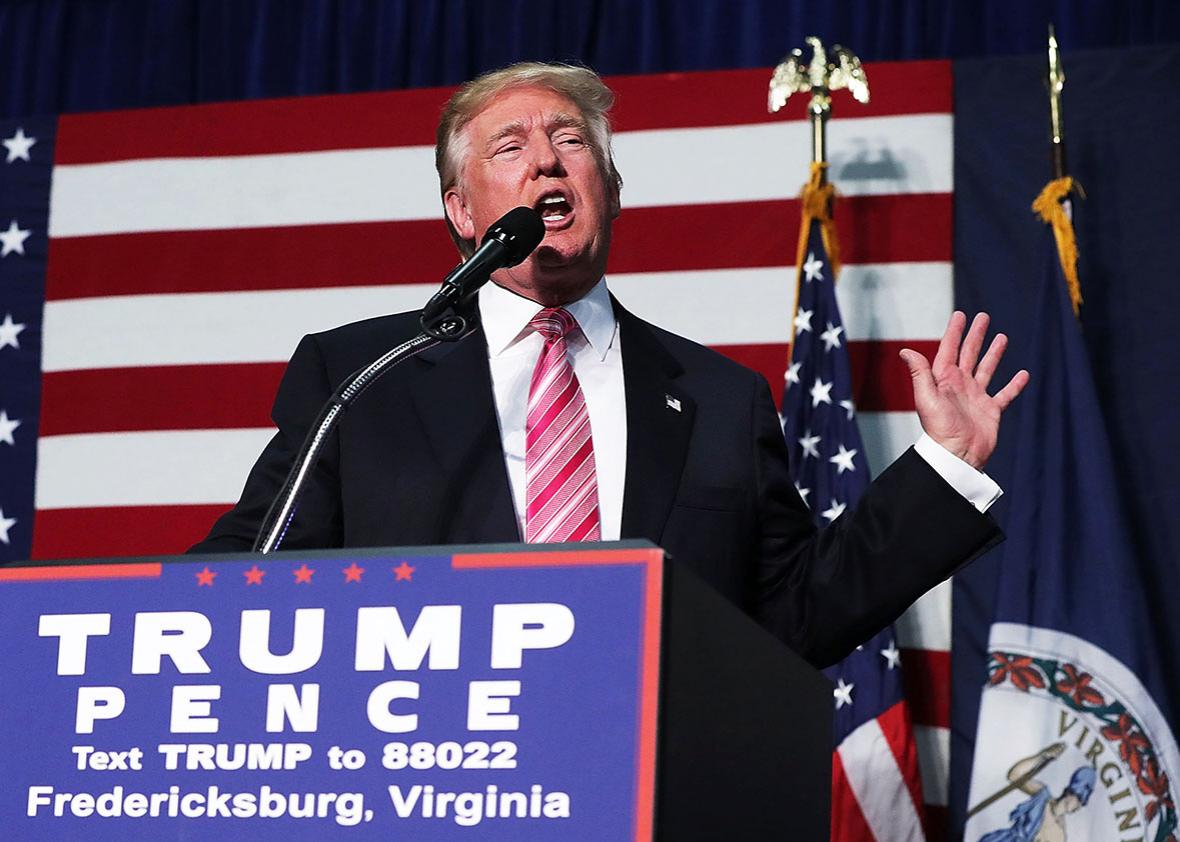It is more than a little funny to watch the political world try to suss out Donald Trump’s allegedly new immigration policy, as though there is, was, or ever will be such a thing. Trump is not familiar with immigration policy, because he’s not familiar with any policy. Building “the wall” is not a policy. It is a project. The wall is a wall. There are people who have written white papers for him. If he has read them, then I’m the Brookings Institution.
Writing in Slate about Trump’s foreign policy speech last week, Isaac Chotiner argued that Trump doesn’t have foreign policy ideas; he just has foreign policy moods. “Trump’s policies may loosely cohere into some sort of familiar ideology,” Chotiner wrote, “but his campaign and his ideas all basically exist within his head.”
Few ideas exist in his head, either. He doesn’t even have a whole lot of nouns at his disposal. His head is mostly descriptors, adverbs and adjectives, up to a second-grade level. Someone—an interviewer, a staffer—tees up a noun for him, he assigns descriptors to it, and then the poor pundits try to determine where his descriptions of nouns in the news land on the recognizable political spectrum. Some staffer gets to him and says, Hey, polls are bad. Time for a new adjective. The cycle repeats. Throughout all of this, 14 months and counting, the candidate has had absolutely no idea what he is talking about. This applies to foreign policy, immigration, tax cuts, nuclear weapons, Morning Joe, whatever.
“After spending a few days reflecting on his immigration stances and consulting with Hispanic supporters,” goes the lede of the Washington Post’s story on Tuesday, “Donald Trump on Monday detailed how he would deal with the millions of immigrants illegally living in the United States: Enforce laws that are already on the books and continue to do what President Obama is doing, although ‘perhaps with a lot more energy.’ ”
It’s quite something that Trump still believes he’s at war with the Post after an exceedingly generous framing like that. Maybe it was meant tongue-in-cheek. If so, bravo. Because the contrast here between buildup and payoff is hilarious. Trump spent “a few days” both “reflecting” and “consulting with Hispanic supporters” about supposed “immigration stances,” and after this scrupulous, comprehensive policy canvassing, finally “detailed”—this is the best word!—“how he would deal with the millions of immigrants illegally living in the United States.” This “detailed” plan is just maintaining the status quo (as he views it), “perhaps with a lot more energy.” His plan, as “detailed,” is an adverbial clause.
Well, maybe that’s not fair. He detailed his detailed plan with further details as his detailed discussion with Bill O’Reilly continued Monday night. Of the millions of undocumented immigrants who are here, Trump explained, there are two subgroups: the “bad ones” and “everybody else.” He has used these subgroups before. About this time last year his attitude was that the “bad ones” and “everybody else” would all have to go, but maybe some of the “good ones”—interchangeable for the most part with “everybody else”—could come back in later. That seems to be roughly the same attitude he holds now, but with tweaks to the descriptors. The “bad ones” will be deported “so fast your head will spin,” a metaphor about velocity that only dupes would describe as a policy position. The “good ones,” meanwhile, will have the luxury of dealing with something resembling a legal process, though “perhaps with a lot more energy.”
If the intensive reflection, consultation, and analysis that took place before Trump’s O’Reilly interview achieved anything, it was to stretch existing adjectives and adverbs into these multiword descriptors. On Sunday morning, Trump’s new campaign manager, Kellyanne Conway, went on CNN’s State of the Union to clarify what he might have said or not said the previous day during a closed-door meeting with Hispanic supporters. “It’s that we need a, quote, fair and humane way of dealing with what is estimated to be about 11 million illegal immigrants in this country,” she said. Fair, humane. On Monday morning’s Fox and Friends, Trump described his plan thusly: “We want to come up with a really fair but firm answer. It has to be very firm. But we want to come up with something fair.” Really fair. Firm. Very firm. Also, too, fair.
The remark from the O’Reilly interview that’s getting the most attention is his invocation of Obama’s immigration policies: “What people don’t know is that Obama got tremendous numbers of people out of the country.” Tremendous. The number of undocumented immigrants that Obama “got … out of the country” is far too large for immigration doves and far too modest for immigration hawks. Donald Trump does not know what those policies are. What happened, most likely, was that someone showed Trump a six- or seven-figure number and he thought, “Firm,” but he can’t outright praise Obama’s work on immigration, so he said “perhaps with a lot more energy,” but he also wants to exude a sense of sunniness, so he said “fair.”
Donald Trump doesn’t know President Obama’s immigration policy—the things he is doing, the legislation he sought to pass, or the executive orders either in place or mothballed in federal court. He doesn’t know Obama’s immigration policy because he doesn’t know immigration policy, and he doesn’t know immigration policy because he doesn’t know policy. There are no “shifts” in policy, because there is no policy, and there are no details of something that doesn’t exist.
